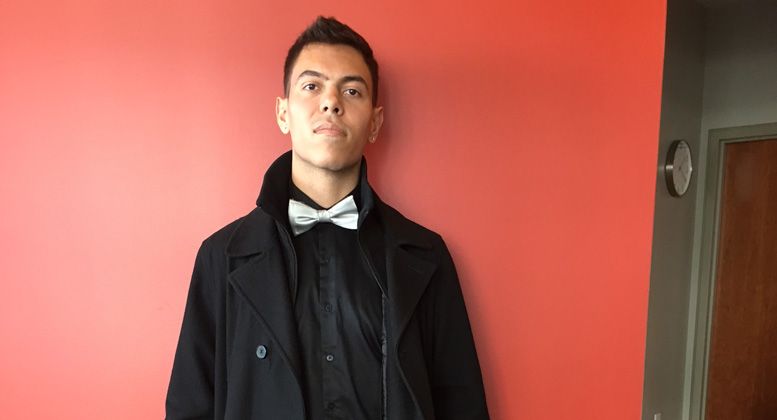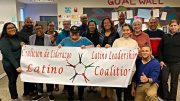An examination of how a Trump presidency will affect disenfranchised groups
By: Mike Yepes*/TRT Guest Columnist—
November 8 was a whirlwind of emotions. Starting my day off in Rhode Island, I eagerly rushed over to my local polling location in Providence at 7 a.m. with my younger brother to cast my ballot for Hillary Clinton.
She was not perfect, not by a long shot, and any claims to the contrary were often rooted in the shortcomings of white feminism—which roots its platform in the obstructions faced by cisgender white women without nuanced conversations around race, class, ethnicity, queer theory, and other issues related to identity. However, what she did hold was potential for progress and improved communication—a quality I felt was lacking in Donald Trump.
This election was symbolic for many reasons, but one stood out to me the most. This would be the first time my mother, a Latina who immigrated to this country from Colombia in 1985, would be able to cast a ballot in a national election. Having endured xenophobia, sexism, racism, and all the other struggles experienced by immigrant communities due to culture shock and language barriers, she, more than most of us, had just as much to gain as she had to lose in this election.
Listening to her pro-Hillary rhetoric while she tried to contain her jubilee, I was reminded that my political selections that day would hold consequences for all of us, but the impact would be felt heavier by our most disenfranchised populations.
Tragically, fate would not be on our side. As Election Day came to a close, I followed the election results back home in Boston in disbelief as Trump was proclaimed president-elect with 304 electoral votes—34 more than the minimum of 270 needed to win the election.
This feat was harder to digest when I realized that he lost the popular vote to Hillary Clinton by approximately 2.9 million votes. Donald Trump became the fifth candidate in U.S. History to win the presidential election despite losing the popular vote. Moreover, he lost it by the largest margin ever when compared to his four predecessors, John Quincy Adams in 1824, Rutherford B. Haynes in 1876, Benjamin Harrison in 1888, and George Bush in 2000.
My initial reaction to the results was fear of what this might mean for my own loved ones. However, as I engaged in dialogues with the broader Latinx communities in both Providence and Boston, I learned that many of us shared similar concerns. A realization made more concrete by media outlet exit polls conducted by The New York Times showed that 29% of Latinx constituents voted for Trump.
Renata Teodoro, the former lead coordinator of the Student Immigrant Movement (SIM) and current member of the organization’s chapter at UMass Boston expressed concern over the election’s impact on undocumented individuals.
Teodoro remarked, “We know that Trump promised to take away DACA and for people like me, that is how I survive. I have been able to work and support myself through this work permit and also been able to travel to visit my family in Brazil. The thought of me not being able to travel or that I could be losing my job in a few months is very scary.”
For those unfamiliar with DACA, it is also known as Deferred Action for Childhood Arrivals. Approved in June 2012 by the Obama administration, this policy allows youth who immigrated to the U.S. before their 16th birthday and before June 2007 to receive a renewable two-year deferral from deportation and a work permit to continue employment and academic studies in the country.
Outside the realm of immigration, a Trump presidency can also prove detrimental to the economic plight of the very citizens who elevated him to office—with a stronger blow to Latinx communities who often experience limited upward mobility on the socioeconomic ladder.
Santiago Nariño, president of the College Democrats of Massachusetts said, “In labor we’re probably going to see a huge amount of pushback on minimum wage. We’re going to see no progress in regard to labor [at] the federal level. And probably you might see a lot of pushback on labor regulations—leaving jurisdiction on the state level. The communities that will suffer the most will be in Republican-led states.”
Nariño, who is of Colombian descent, added that the damage of a Trump presidency will even be felt along the axis of healthcare.
“Latinx communities get Obamacare at the highest rate and it’ll be interesting to see what happens moving forward [since Trump has attacked Obamacare throughout his campaign],” he said. “[According to the U.S. Department of Health & Human Services] 4.2 million Latinos have been able to get health insurance coverage through Obamacare”.
Many have looked to the future as a beacon of hope, reminding each other that Trump’s presidency will only last until 2020, at which point there will be an opening for a new leader. Furthermore, many seats in Congress will be up for reelection in 2018, providing many states with the opportunity to saturate the legislative branch with progressive candidates; leaders who can at least filibuster and gridlock harmful policies or create socially conscious bills that could help bring about equity in this nation.
Latinx activists have also emphasized the importance of movement mobilization in order to ensure such victories.
Teodoro reminds us, “the history of the U.S. has been a history of exclusion, [and] people forget that you were only considered a part of the ‘melting pot’ if you were from Europe. Only European immigrants could contribute and blend in to create the American identity.”
As a result, if we seek to ensure equity and justice for communities of color, including Latinx spaces, we have to empower our communities to actively fight for their rights to safety and liberty. The future will be a bright one! Trump may try to dim our brilliance, but we will win and we will succeed!
*Mike Yepes is a genderqueer Latinx social justice activist in the Greater Boston area. They graduated from Brown University in 2013 with a B.Sc. in Neuroscience and currently works in the realm of sexual health advocacy while applying to graduate programs to pursue a Masters in Public Health. Their long term interests revolve around health care equity for immigrant, queer, and POC communities and those who find themselves at the intersection of these identities.







